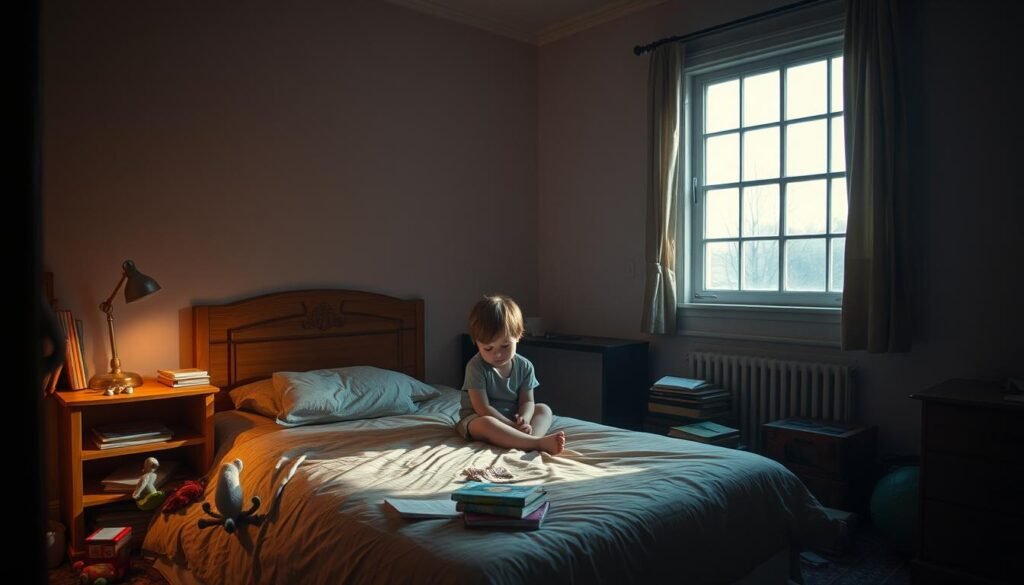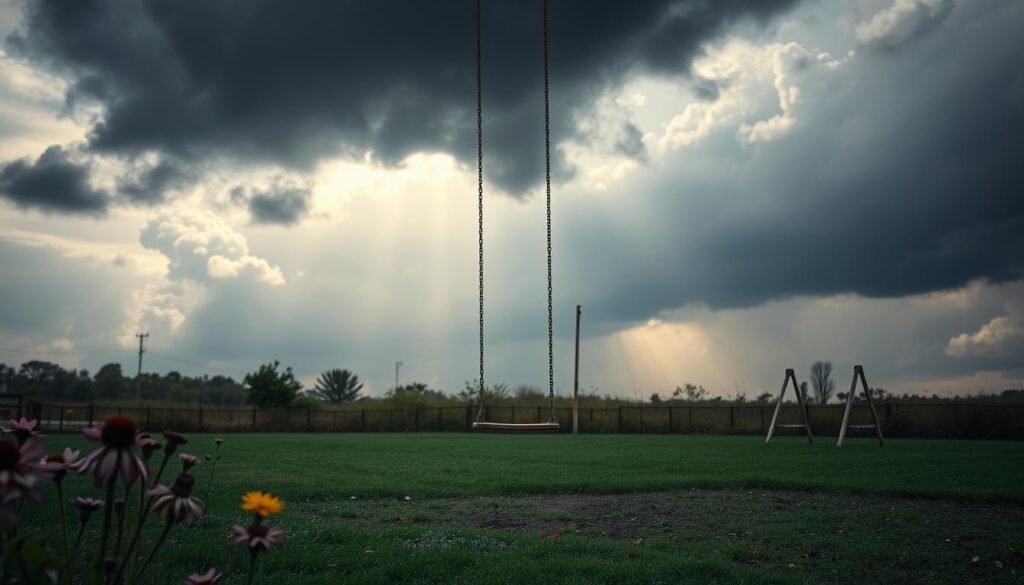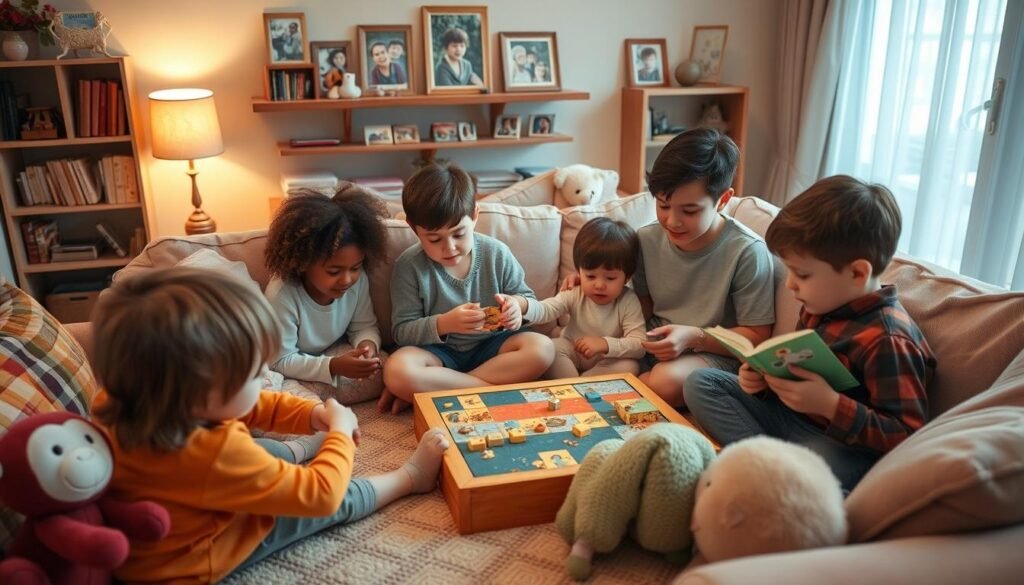In the U.S., up to 3% of children and 8% of adolescents are coping with depression. It’s more common than many think. Not all mood swings in kids are just part of growing up. If your child feels sad or irritable for weeks, it might be more serious. Childhood depression can deeply affect a kid’s emotions.
This condition requires quick action to help those affected. Early detection and support can change a child’s life for the better. It’s critical to understand the signs and what leads to this issue. Let’s learn how to spot them early and help our kids heal.
Key Takeaways
- Up to 3% of children and 8% of adolescents suffer from depression.
- Girls often attempt suicide more frequently, while boys are more successful in completing suicide attempts.
- Children with a family history of abuse are at greater risk for depression and suicidal behavior.
- Symptoms of depression in children can include sadness, fatigue, and social withdrawal.
- Encouraging children to express their feelings is a vital step in detecting depression early.
- Cognitive Behavioral Therapy (CBT) is an effective treatment for childhood depression.
Understanding Childhood Depression
Childhood depression is more than just mood swings. It’s a deep sadness that affects how kids interact, perform in school, and get along with family. Often, people don’t notice it because its signs look like typical emotional ups and downs. But it’s a serious mental health issue in both young kids and teens, needing attention from parents and caregivers.
Recent studies show over 10 percent of teens 12-17 face major depression each year. Spotting mood disorders early in kids matters a lot. It stops bigger problems later. Girls get diagnosed twice as much as boys. A diagnosis requires showing depression signs for at least two weeks. For a longer-lasting kind, symptoms must last a year.
Kids with this depression feel very sad, get easily annoyed, and lose interest in fun activities. They might also feel hopeless, think very little of themselves, have trouble sleeping, and eat more or less than usual. Finding and treating these signs early is key. It helps a lot, sometimes completely fixing the issue.
Certain tough experiences like abuse, big life changes, or chronic illness can make kids more likely to get depressed. Those with anxiety are also at risk. Being supportive and getting professional help is crucial for recovery. For deeper understanding, parents can check out understanding depression in children.
Signs and Symptoms of Depression in Children
Finding signs of depression in children can be tricky. It’s important to catch it early to help their emotional health. Watch for emotional, physical, and behavior symptoms. Parents and caregivers need to pay close attention.
Common Emotional Symptoms
Emotional symptoms are often early warning signs. Kids may feel always sad or mad, leading to feelings of emptiness or low worth. They may stop liking activities they used to love. These issues can really affect a child’s emotions.
Physical Symptoms to Watch For
Physical symptoms are sometimes missed. Look for tiredness, eating more or less, and trouble sleeping. Kids might also feel pains without a clear reason. These can make their health worse, making it hard for them to handle things.
Behavioral Changes Indicating Depression
Changes in how children act can tell us about their mental health. A drop in interest in fun activities is a red flag. They might find focusing hard, get worse grades, and not want to be with friends. Parents should watch out for these big changes in behavior.
If these signs keep up, getting help is critical. Good treatments can really help kids who need it. Parents can visit this useful guide for next steps. It’s important to know what to do if you’re worried.

Why Early Identification is Critical
Knowing early signs of childhood depression is key to helping kids. About 20% of young people face mental health issues. Sadly, most don’t get the help they need. This fact shows how important it is for parents to spot depression early.
Acting early against depression is crucial. It helps kids grow emotionally and socially. For instance, 11% of teens struggle with major depression. And 7% endure severe depression. These numbers show we must act fast when we notice depression signs.
Half of mental health issues start before age 14. Depression can show up in very young children. Parents need to watch their kids closely. This can lead to getting help early, which is so important.
Getting help early can stop bigger mental health problems. Studies find that depression in young kids can last into older years. But with the right support early on, kids can overcome these challenges. They can have a happier, healthier life.
| Age Group | Prevalence of Depression | Help Received (%) |
|---|---|---|
| 3-17 years | 2.1% | Approximately 36% |
| Adolescents (12-17 years) | 11% (Major Depression) | 64% do not receive treatment |
| Young Adults | Greater than 20% by age 18 | Lack of access for 8% |
Early identification of childhood depression is crucial. It ensures kids get the mental health support they need. It benefits their well-being, helping them do well in school and with friends.
https://www.youtube.com/watch?v=65qasq15S8w
What Causes Depression in Children?
Parents and caregivers need to know the causes of depression in children. It often comes from a mix of genetics, environment, and psychological factors. If a child’s parents have faced depression, that child may be more at risk.
Life’s hard moments, like trauma or losing someone, can start depressive episodes. This shows why it’s key to step in early.

Having long-term health problems can make these issues worse. A troubled home life can also stress kids out. This might show in how they act or how well they do in school. Knowing these risk factors helps parents get a better grasp on childhood depression.
“Early awareness and understanding of the causes can empower families to seek support.”
To fight these problems effectively, check out treatment methods that mix therapy with practical help. It’s crucial to deal with possible issues like symptoms getting worse or the dangers of not treating depression. Building a solid support network and understanding the many aspects of youth mental illness are vital steps for parents.
How to Talk to Your Child About Depression
Talking about depression is key to caring for your child’s emotional health. Parents are important because they support their kids. They help them share and understand their feelings. This makes kids feel safe to talk about any problems they have.
Creating a Supportive Environment
Creating a supportive home is the first step to discuss tough topics like depression. It’s important for parents to show unconditional love. This lets children open up without being scared of judgment. A supportive home includes:
- Active listening to what children share.
- Validating their emotions and experiences.
- Encouraging expression through art or writing.
Encouraging Open Communication
Having open talks is important for children’s emotional health. By asking about their day or feelings, parents can start conversations. It’s good to make talking about feelings normal. This helps kids know it’s fine to talk about being sad or upset. To keep these talks going, parents can:
- Regularly check in with kids about their feelings.
- Use current events or stories to start talks about mental health.
- Create a cozy time for chats, like during meals or at bedtime.

Open talks make parents a big support for their kids. This helps kids deal with tough feelings and ask for help when needed.
How Can I Tell if My Child Is Depressed?
It can be tough for parents to see if their child is depressed. They need to watch closely and understand their child’s feelings. In the U.S., about 16% of kids and teenagers say they feel depressed. It’s crucial to spot these feelings early on to help kids deal with their mental health.
Duration of Symptoms
How long a child feels depressed is important to know. A child might have Major Depressive Disorder if they are down for two weeks or more. If they are sad for even longer, it could be Persistent Depressive Disorder. This means their struggle is serious and ongoing. Getting help early can make a big difference for them.
Interference with Daily Life
When depression changes how a child lives day to day, it’s a big concern. Parents should watch how their child talks to others, does in school, and if they stop liking their usual hobbies. If a kid pulls away from friends or stops enjoying things they loved, it could hinder their learning and making friends. It’s critical to seek help from a doctor if you see these signs. Catching these signs early can lead to getting help they need. For tips on spotting depression, visit this resource. Also, reading about depression can help; check out these books for parents and kids.
Depression in Children: Treatment Options
Treatment for childhood depression combines therapy and medication, suited to the child’s unique needs. It’s important to know the treatment options available. This includes the types of therapy and medication that work best.
Cognitive Behavioral Therapy (CBT)
Cognitive behavioral therapy (CBT) is the top choice for treating childhood depression. It helps children see and change negative thoughts and actions that make them sad. Studies show CBT gives kids skills to cope and be resilient. Families help a lot by supporting these changes at home.
Medication for Childhood Depression
Sometimes, therapy alone isn’t enough, so doctors may suggest medication. SSRIs like fluoxetine (Prozac), citalopram (Celexa), and sertraline (Zoloft) are commonly used. They balance mood and reduce depression signs in kids. It’s vital to talk with doctors about any side effects to keep kids safe during treatment. Experts say staying on medication for a year after feeling better can prevent depression from coming back.
| Medication | Type | Usage |
|---|---|---|
| Fluoxetine (Prozac) | SSRI | First-line treatment for childhood depression |
| Citalopram (Celexa) | SSRI | Effective for treating adolescents |
| Sertraline (Zoloft) | SSRI | Frequently prescribed for pediatric patients |
| Tricyclic Antidepressants | Not Recommended | Avoid due to high side effects in children |
Using both cognitive behavioral therapy and the right medications can really help children with depression. Sticking with the treatment plan can make a big difference in their mental health.
Steps Parents Can Take to Support Their Child
Parents play a big role in their child’s emotional health, especially when dealing with depression. It’s important for them to watch for any changes in their child’s mood or behavior. Noticing these changes early can help parents step in and support their child when needed. This also builds trust and makes it easier for kids to talk about their feelings.
Monitoring Changes and Being Attentive
Keeping the lines of communication open is key. By watching how their child is feeling, parents can spot warning signs sooner. They should aim to make many more positive comments than negative ones. This balance can help a child feel supported, not criticized. Also, looking into resources like stress management techniques can teach parents how to be there for their child.
Engaging in Positive Activities Together
Doing fun activities together can lift everyone’s spirits. Whether it’s sports, hobbies, or just being outdoors, these times can shift focus from negative to positive thoughts. It’s also good for kids to hang out with friends who support them. In the end, spending quality time with family strengthens bonds and supports mental health.